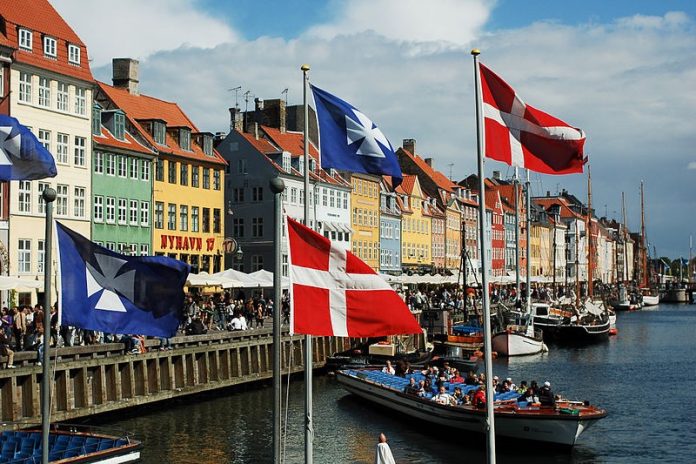I went to Denmark and found little of the angst and anger that plagues Americans today. Kinda makes you think.
I started roaming the world just over 30 years ago in a state of arrogant provincialism: Strong was my conviction that the US had figured things out while other places were pitiful backwaters or sleepy museums. That’s what Ivy League degrees, nightly network news, and the jackhammer propaganda of exceptionalism will get you.
I just spent a few days in Denmark, one of the sleepy museums. Let’s just say that they may have figured something out as well. We might try to learn a little from them.
Taxes are high, yes: Denmark has the highest tax-to-GDP ratio in the developed world, at 46.6% (compared to 16% in Mexico, 25% in the United States, 33% in the UK, 42% in Italy and so on). On the upside there is no wealth tax.
That money buys a lot. The place is spotless and functional. The people are well-behaved in a way that suggests contentment and trust (I saw practically no jaywalking). Public transport is efficient and clean. The social safety net is real, universal healthcare is beloved, and higher education is free as opposed to the bankruptcy-inducer that it is in the United States.
Consequently, the UN-derived World Happiness Report has Denmark at number 2 in the world after Finland. Sweden, Iceland, Norway and the Netherlands are all near the top as well.
You know who’s nowhere near the top of the list? The United States is not.
Perhaps that is because the United States has no healthcare guarantees before retirement and a political culture torn between far-left progressives who think universities should be safe spaces from offense and raging MAGA malcontents who seem consumed with a need to cause it.
It also features the developed world’s highest rate of gun deaths: On a per capita basis, there were 14.6 US gun deaths per 100,000 people in 2021–29 times as high as in Denmark, which had 0.15 deaths per 100,000. You have to wonder at Americans who think this is a mental health problem unrelated to the US lacking almost any control on gun sales; are Americans 29 times crazier than Danes?
Do the Danes lack such madness because they’re homogeneous? Not really. There is little palpable racial tension despite the recent arrival of many immigrants (now approaching 10% of the population); they seem to mostly adapt to local ways, probably because these are appealing. The country, currently at around 6 million population, is slightly larger than Norway and Finland, but just over half the population of Sweden.
Law enforcement is almost invisible, as opposed to the quasi-police state currently being created in the United States.
Is the US at least far richer, as its reward for exceptional distinctions? Well, the US has a higher growth rate at present, and ranks higher on the innovation tables. But it’s not exactly richer: According to the World Population Review rankings, the US stands at $69,185 per capita, edging Denmark at $68,037. And then there are quality-of-life indices that factor in more than money — and there Europe tends to rise even more.
Indeed, I get a feeling the Danes’ happiness is not really about money. I saw people I knew are wealthy biking everywhere on bike lanes which in Copenhagen are truly ubiquitous, snaking without interruption through the metro area. Everyone respects their right of way. That is, they bike when they are not walking: I was chewed out by a taxi driver for hailing him when my destination was only 2 km away — a half-hour walk that would do me good. Another taxi driver lectured for some time about the virtues of civility and “collegiality”; yes, a taxi driver. He didn’t seem to mind that almost everyone takes the light rail/metro.
People frown at you if you ask for a receipt — only foreigners would be so un-green. Same for a plastic bag. So you don’t see a lot of trash lying around.
Wealth is present but not ostentatious. Homes have clean lines and simplicity — not ornate decorations. Everything seems driven by the Danish-Norwegian concept of Hygge (pronounced hyoo-ga) which describes a mood of coziness and “comfortable conviviality” with feelings of wellness and contentment. It is a cousin of Holland’s gazellig, which some outsiders may have recently discovered on account of an Amsterdam-based episode of the Apple TV+ hit “Ted Lasso.”
Maybe the secret is something entirely different — something that in my view ranks among the best-kept secrets in the world: Copenhagen has among the best hot dogs to be found in any corner of the globe, by a stretch. They are crisp on the outside, sumptuously flavored and sometimes containing cheese, and the toppings are beyond compare, with possibilities including creamy, curried remoulade sauce, fresh pickled cucumbers and crispy fried shallots which somehow stick to the sausage.
There is a local name for these — Pølser — but somehow in recent decades it became “hotdogs.” That is a little odd, because though the locals speak excellent English — and often with near-perfect British or American accents — the culture is quite distinct and not overtly Americanized. I’m told it was a marketing ploy. Either way, the safest way to find hygge is to try a ristet hotdog med det hele (there are vegan options, worry not).
At the National Museum of Denmark, one is bombarded with the country’s past as the epicenter of Viking culture. By marauding, pillaging and raping, they left quite a mark — including linguistically — on neighboring lands including the British Isles a mere 600 kilometers directly due west across the North Sea (consult the map — it’s true). Their repugnant practices included internal violence, usurpation and geriatricide.
“There seems to be no connection between these maniac Vikings and all the civility I see around me today,” I told a friend.
“Every society must seemingly go through a barbaric phase to reach Valhalla,” he replied with equanimity. “Each goes at its own pace.” Perhaps once the hierarchy of needs is met the risk-reward equation changes, suppressing our inner bear, he mused, pedaling his rickshaw, with me in the front seat like an oafish toddler.
Perhaps there is hope for us yet.

















